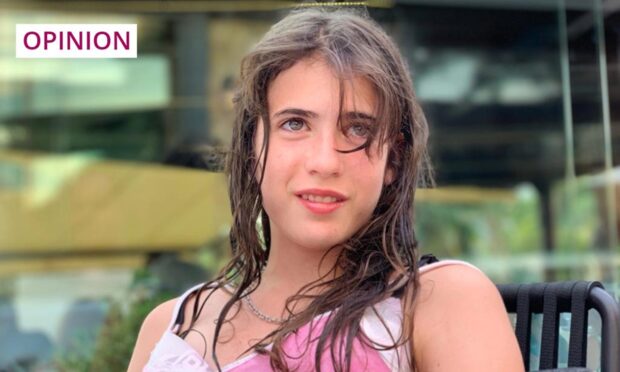If you are a mother or father, hearing the tragic accounts of parents who have lost children prompts a visceral reaction: a wave of empathy and a simultaneous shiver of fear; a desire both to listen and not listen.
Walking in their shoes – even metaphorically – is too painful, because to do so involves imagining your child in their child’s place. Vague fear morphs into concrete terror.
When Mother’s Day, or Father’s Day, rolled around after my parents died, I felt the sadness of loss. Now, it is not only the parentless child I think of on those days, but the childless parent.
Recently, Mariano Janin talked publicly about the suicide of his 14-year-old daughter, Mia, after she was cyberbullied by a group of boys at JFS school in London. Her story emphasises the power and control issues that exist in schools, the contempt that boys currently express for girls, and the over-sexualisation of children in general.
School inspection reports in England have highlighted that 90% of girls consider unsolicited explicit pictures and sexist name-calling part of school life. This week, in Scotland, the first minister launched a campaign to tackle gender-based violence in schools.
At Mia’s school, “the suicide squad” took screenshots of girls’ faces on social media and ridiculed them. They also Photoshopped girls’ faces onto the bodies of pornography performers.
The school’s public comments ring alarm bells. Mia’s experience, JFS claims, bears no relation to the school today. It sounds like an attempt to defend the school’s reputation, rather than accept responsibility for its culture. Mariano Janin pointed out that, after Mia died, the school told the boys to delete their messages.
Mariano Janin, the father of Mia Janin who took her own life after being bullied both online and in person, is campaigning for a new law on cyber bullying
Listen to Laura Kuenssberg and Paddy O’Connell on the latest #BBCNewscast…
— BBC Sounds (@BBCSounds) March 3, 2024
Both girls AND boys need protection. No doubt Mia’s tragic death will have damaged some of those boys who foolishly did not anticipate their toxic behaviour having such terrible consequences. For those unchallenged, who carry these attitudes into adulthood, there are other social consequences in terms of their inability to form equal relationships with women.
Let’s talk about women’s reaction to male power
There is, though, also something about women’s reactions to conflict, to male power, that needs addressing. Mia internalised her pain, feeling hopeless in the face of it. She became voiceless.
A less serious example lies in the recent video, which went viral, of a female golf pro being given unsolicited male advice about her “defective” golf swing. The golf pro’s half-hearted challenge was as interesting as the mansplaining.
Women simply absorb sexist comment. Often, they subtly accept responsibility for defusing it
“Thanks for the advice,” she said eventually, stuffing her feelings somewhere deep inside her golf bag. It wasn’t in her, she said later, to tell him she was actually a professional player.
It is impossible to imagine this incident with a male golf pro and female “expert”. Women, as a recent report into harassment during sporting activities revealed, simply absorb sexist comment. Often, they subtly accept responsibility for defusing it. The golf pro’s dignity and restraint were admirable. But assertion need not be undignified or unrestrained.
‘Let your fire always be fierce’
There is a fascinating 1990s paper about girls’ development called Meeting at the Crossroads, which highlights the way adolescent girls gradually lose their voice, self-confidence and vivacity as they approach teenage years. They experience “the feeling of not being listened to or heard or responded to empathically, the feeling of not being able to convey, or even believe in one’s own experience.” Some 30 years later, interactions between teenage boys and girls suggest this has never been solved.
As does Nadiya Hussain’s letter to her 13-year-old daughter, produced for the BBC podcast Dear Daughter. Television chef Hussain describes the way her spark was extinguished as a child because she was a girl. “That girl,” she wrote, “well, she was nothing like your mother. This girl, she was wild. She had great thoughts and even greater dreams. She wasn’t afraid to speak her mind…
Dear Daughter is the award-winning podcast building a 'handbook for life'.
In the new series, Bake Off winner @BegumNadiya writes a letter to her 13-year-old daughter about how to make space for herself wherever she goes.
🎧 Listen on @BBCSounds. https://t.co/lPeCLhBVu3
— BBC Current Affairs (@BBC_CurrAff) March 4, 2024
“Sometimes I daydream and wonder where that little girl went. Then I look at you and realise you are that little girl… Just know that the little girl inside me that I once was, and I once lost, is holding your hand. And we won’t lose another little girl ever again.”
I could not help thinking of Mia Janin when I read Hussain’s words; of who she was, what was lost, and of all the hopes that mothers – and fathers – have for their daughters. Months after Mia died, her mother died of leukaemia. Her father says sadly that he exists in a house with a small dog, where once he had a home with a wife and daughter. I guess Mother’s Day will be a sad one for him.
For the rest of us who are parents, it is an opportunity to reflect, not just on what we receive from our sons and daughters that day, but what we give to them in life to help eradicate this toxicity. Nadiya Hussain refuses to allow her children to be unequal. “Let your fire,” she urges her daughter, “always be fierce.”
Catherine Deveney is an award-winning investigative journalist, novelist and television presenter

Conversation